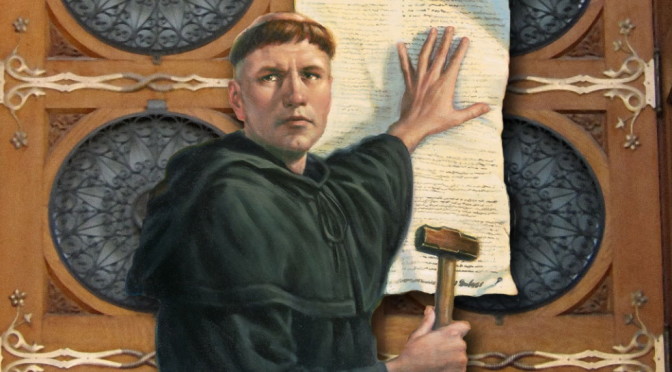In 1517 Martin Luther was provoked by Johann Tetzel to write his famous 95 Theses. In the spring of 1517, Johann Tetzel, a German friar who practiced the selling of indulgences in Germany, was preaching on indulgences in the city of Jüterbog. By selling indulgences, Tetzel and the Catholic Church gained monetary value in exchange for a believer’s future diminished time in purgatory. In other words, one’s sins would be forgiven if one were to buy these indulgences. Luther, who was a Theology professor at the University of Wittenberg, attended to Tetzel’s preaching. Luther felt disgusted by the act, and as a Theology professor he felt that he had to address this issue in a scholarly way. During the summer of 1517 Luther started to write the 95 Theses, which was not only a criticism of the selling of indulgences, but also a criticism of many of the actions and practices of the Catholic Church, particularly of its hierarchy. 1

The 95 Theses consisted of Luther challenging the teachings of the Catholic Church on the nature of penance, the authority of the pope, and the selling of indulgences. He believed that the salvation of a person’s soul should not be based on one’s monetary contribution to the church. Luther believed that faith was the only way to reach salvation and not the monetary contributions to the church. Quoting Saint Paul, Luther wrote, “The just will live by faith.”2 In the 95 Theses Luther not only criticized the Catholic Church and its corruption, but also set numerous propositions for reforming the Catholic Church. After writing the 95 Theses, on October 31, 1517, Luther decided to nail them to the door of the Wittenberg Church. After this event, the 95 Theses started to be spread throughout Europe. A year after Luther wrote the 95 Theses, they were condemned as heretical by Pope Leo X, and Luther was also excommunicated from the Catholic Church that same year.3
Martin Luther was given the chance to recant his statements against the Catholic Church at the Imperial Diet of Worms in 1521, but he refused. Luther famously said:
Unless I am convinced by the testimony of the Holy Scriptures or by evident reason—for I can believe neither pope nor councils alone, as it is clear that they have erred repeatedly and contradicted themselves—I consider myself convicted by the testimony of Holy Scripture, which is my basis; my conscience is captive to the Word of God. Thus I cannot and will not recant, because acting against one’s conscience is neither safe nor sound. God help me. Amen.4
Luther believed that salvation was reached by faith alone, and not by the works of giving money to the church, and he held to these beliefs for the rest of his life. Luther was also responsible for starting the Protestant Reformation, where a large number of Catholics decided to follow his steps by separating from the Catholic Church. Luther not only started the Protestant Reformation, but he also contributed to the so-called Catholic Reformation of the Catholic Church as well, since his 95 Theses sparked a reform movement within the Catholic Church that culminated in the Council of Trent. Even though Luther was seen as a controversial person in the Catholic Church, he contributed in significant ways to what the Catholic Church is today.5
- Encyclopedia Britannica, s.v. “Johann Tetzel.” ↵
- Romans 1:17. ↵
- Andrew Culp and Kevin Kuswa, “Signs of protest rhetoric: From Logos to logistics in Luther’s Ninety-Five Theses,” Quarterly Journal Of Speech 102, no. 2 (May 2016): 153-154. ↵
- Heiko Oberman, Luther: Man Between God and the Devil (New York: Image Books – Doubleday Press, 1992), 39. ↵
- Scott H. Hendrix, Martin Luther: Visionary Reformer (New Haven: Yale University Press, 2015), 145-150. ↵



52 comments
Samuel Ruiz
Interesting article. It is always different to read about views that disagree with the Catholic Church. Being a high practicing Catholic myself, it was hard to read this article, but I kept an open mind about it. What I found most interesting and honestly, was the Catholic Church’s practice of selling indulgences, which was something I had never heard of before. I would have loved to see more information about how Luther’s separation from the Church helped the Catholic Church evolve, but nonetheless it was a great article.
Alexandra Cantu
The brief article was extremely well written.The story of Martin Luther is one that is truly inspiriational he nailed his 95 Thesis on the Walls of the Church. Luther fought against the corruption of the Church, Luther fought for faith. It is devastating that Martin Luther was excommunicated for something that he truly believed in. At this moment the Catholic Church showed their true colors. A man was fighting for something that was good and was turned away. Wow. Incredible
Hector Garcia
I thought that this article did a great job of depicting the story of Martin Luther. His story has definitely stood out to me because of the courage and bravery that Martin Luther portrayed. At the time, his opinion on indulgences was really risky because it meant speaking out against what the Catholic church. Overall, his 95 theses began a movement that would lead to the creation of the Lutheran Church.
Anna Guaderrama
Ok, so I knew who Martin Luther was before reading this article, but I guess I never payed much attention to his significance because I actually learned a lot from reading this. I personally agree with Luther’s belief that salvation is reached through faith alone. I’ve discussed this topic with people many times and I don’t know if it’s just the encounters I’ve had with the parishes I’ve attended, but I always see an overtly huge emphasis on donation of money…like, to the point where children are encouraged to participate…CHILDREN – more peer pressure being hidden by a bible rather than the actual teachings being taught and it’s sad and frustrating to be in such situations. But, I must say, it’s a bit ironic how he ended up creating a religion even though that was not his original intent.
Michael Thomas
I found this law interesting because of how it details Martin Luther and his 95 theses. Martin Luther wrote the 95 theses as a form of protest against the Catholic Church. Martin Luther was soon excommunicated because he did agree with what the church was doing. This soon led to Martin Luther to form one of the denominations of Christianity, which was Lutheran.
Timothy ODekirk
The story of Martin Luther is one that is truly inspiring. He is an inspiring figure due to his boldness for nailing his 95 Thesis on the Walls of the Church. Luther fought against the corruption of the Church, since the Church was incredibly corrupt during this time. Luther fought for faith and said how faith was the main aspect of the Church and not the corruption. It is disturbing to me the fact that Martin Luther was excommunicated for something that he truly believed in. This just comes to show the true corruption that the Church had during this time.
Natalie Childs
This was a well written article. We just went over this story in World Civ since 1500 a few weeks ago, so it is still pretty fresh, but I definitely enjoyed how the author told the story of Martin Luther. I think that the most interesting thing of this story is that Luther just wanted reform, not to separate, and that even though he was excommunicated, the church eventually did reform, based on his Theses.
Auroara-Juhl Nikkels
I always love learning about Martin Luther. I think what he did was pretty brave at the time, considering that he spoke out against the church and that could be punishable by death. He made very valid points, like the indulgences. I think that, similar to him, you should not be able to buy less time in purgatory. It is not right. I also find it funny how he created his own religion, even though it is not what he set out to do. He only meant to call out the Catholic church and try to have them change some things.
Christopher King
I enjoyed this article about Martin Luther because he did what no one else would do during that time and that was speak against the church and the Pope. For that time period it was as if they were speaking against God. It explained why and how Martin Luther went about his righteous act of rebellion against the policies and beliefs that the Catholic Church had developed and turned it back towards a more righteous path towards God. The fact that people were willing to spend money on forgiveness since it was common for anyone to be poor says a lot of how much the church were using the common people to benefit themselves. .
Tyler Sleeter
Great article. The first time I had ever heard of Martin Luther was when one of my RE teachers told my class that Luther was just a man that could not handle being catholic so he started his own religion. I now know that this is wrong, and Luther did not begin his own religion; his complaints led others to begin the Protestant Reformation that influenced King Henry VIII to create the Church of England. I recently saw a show on PBS that said the printing and reprinting of Luther’s 95 theses was a key factor in the success of the printing press, since so many people wanted to read what Luther had to say.